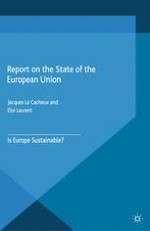2015 | OriginalPaper | Buchkapitel
The State of EU Economic Governance: Not Learning from Previous Mistakes?
verfasst von : Jacques Le Cacheux, Eloi Laurent
Erschienen in: Report on the State of the European Union
Verlag: Palgrave Macmillan UK
Aktivieren Sie unsere intelligente Suche, um passende Fachinhalte oder Patente zu finden.
Wählen Sie Textabschnitte aus um mit Künstlicher Intelligenz passenden Patente zu finden. powered by
Markieren Sie Textabschnitte, um KI-gestützt weitere passende Inhalte zu finden. powered by
From the very beginning, the Eurozone was conceived as a new brand of economic governance institutions: a single currency, with a single, independent central bank conducting monetary policy according to a simple — and almost single — objective of price stability; and decentralized fiscal policies, in the hands of national governments of member states, with simple fiscal rules — the Stability and Growth Pact — and a minimal , rather informal, coordination institution : the Eurogroup. Alongside the objective of monetary stability, the ambition was to foster further economic integration, convergence in living standards amongst member states and sustained growth. Indeed, the “Lisbon strategy” adopted by the European Council in March 2000, a little more than one year after the launching of European Monetary Union, bravely stated that the objective was to make the EU “the most competitive and dynamic knowledge-based economy in the world capable of sustainable economic growth with more and better jobs and greater social cohesion” by 2010. The successor strategy, adopted in 2010 — “Europe 2020” — posted similar, yet less precise objectives of “smart and inclusive growth.” In the minds of its founding fathers, the Eurozone was to be the spearhead of this leap forward in economic and social performance; launched with 11 of the then 15 member states, it would act as a shield from the rest of the world instability and disturbances and would eventually become so successful as to attract all EU member states, including those (Denmark and the UK) that had willingly opted out from the beginning, and those (Central and Eastern European Countries) that would join the EU a few years later.
